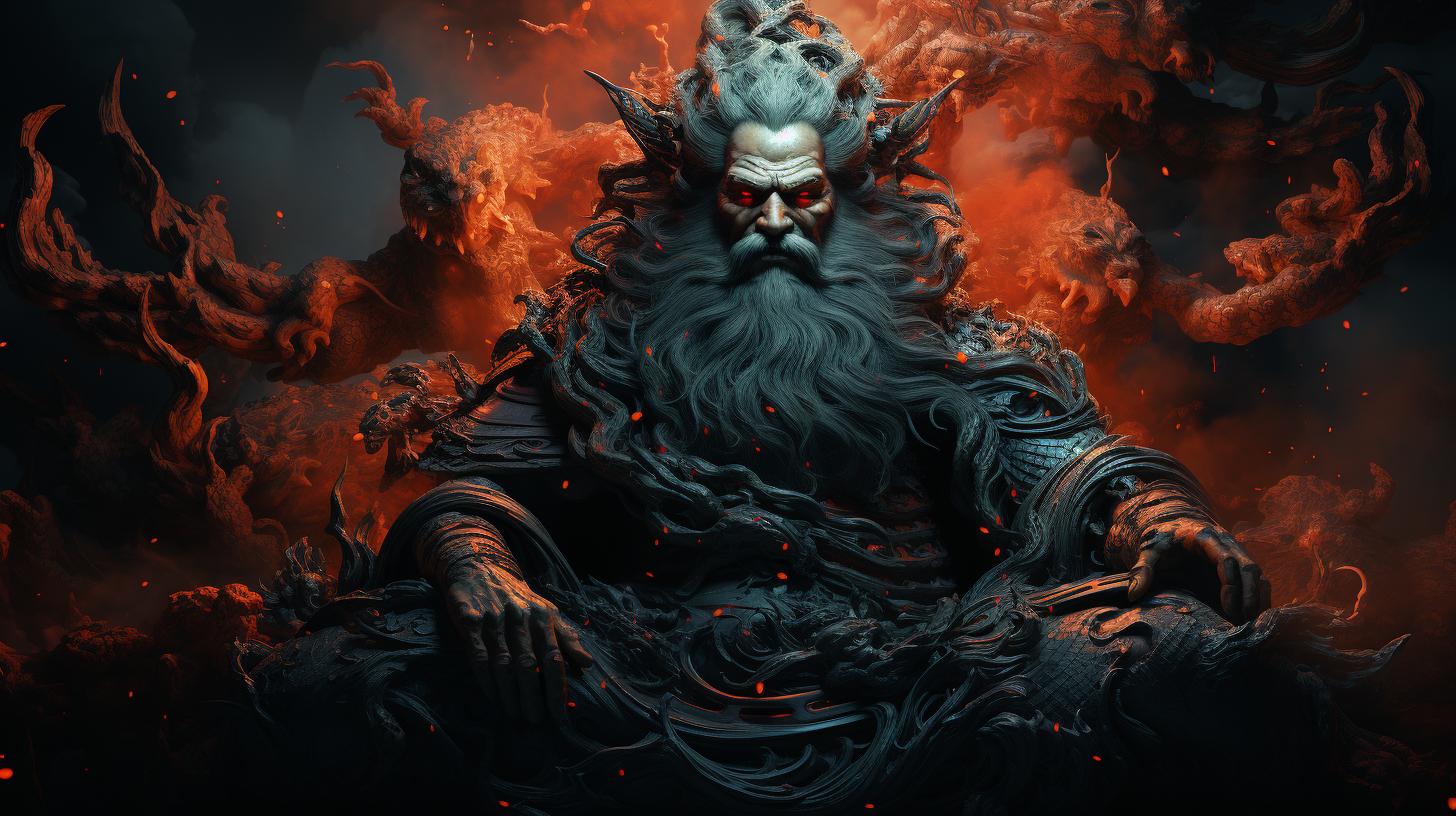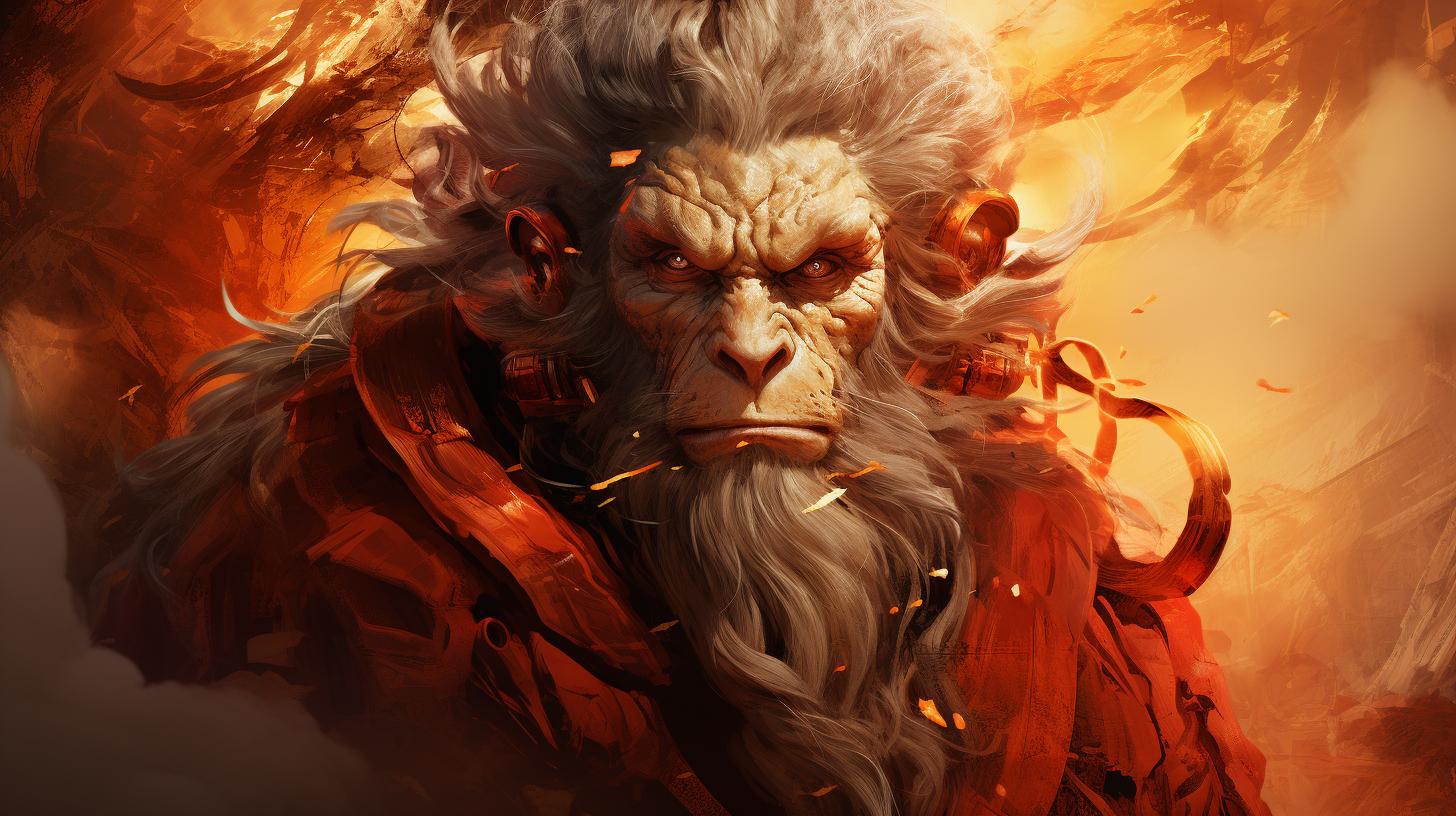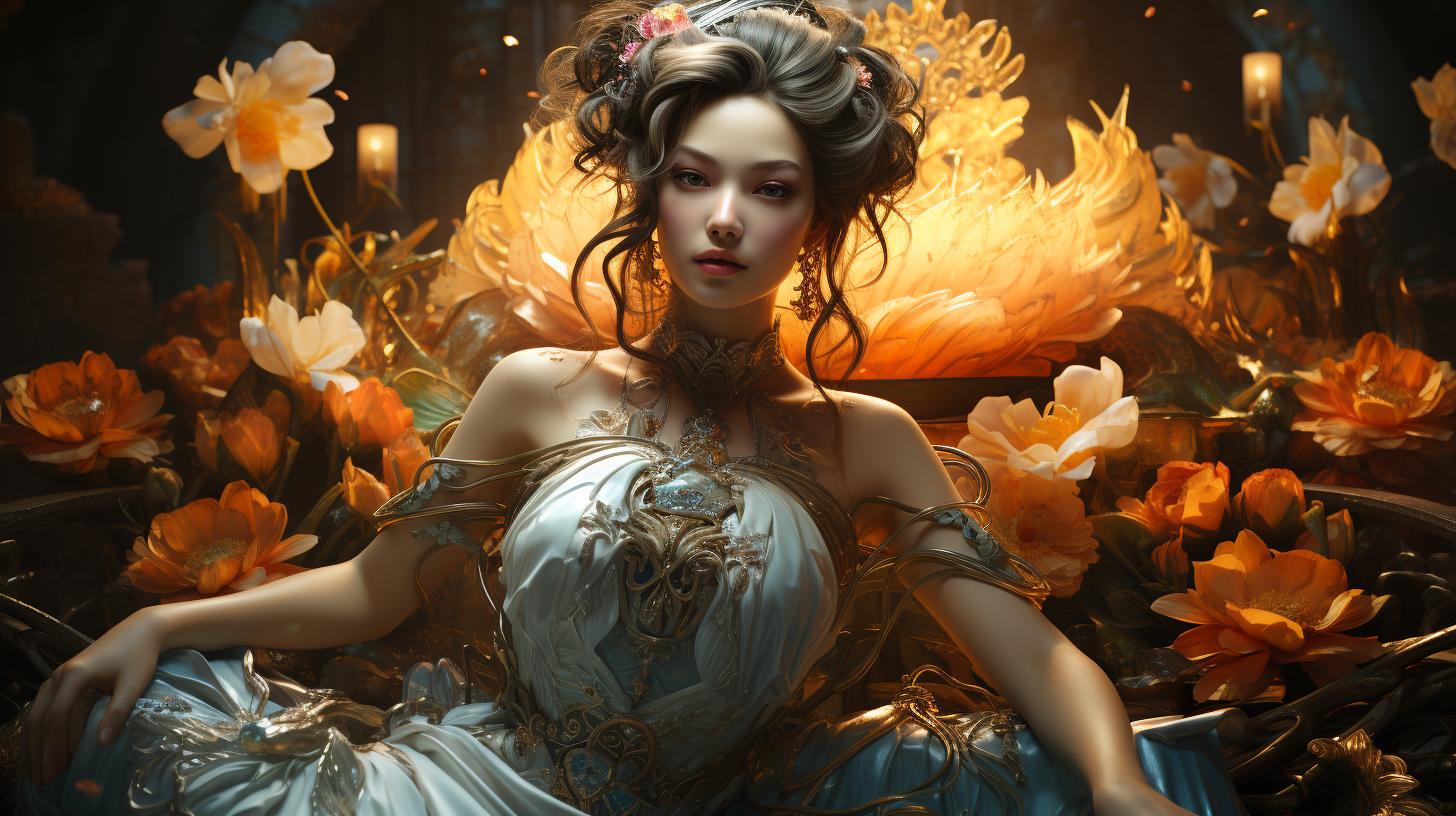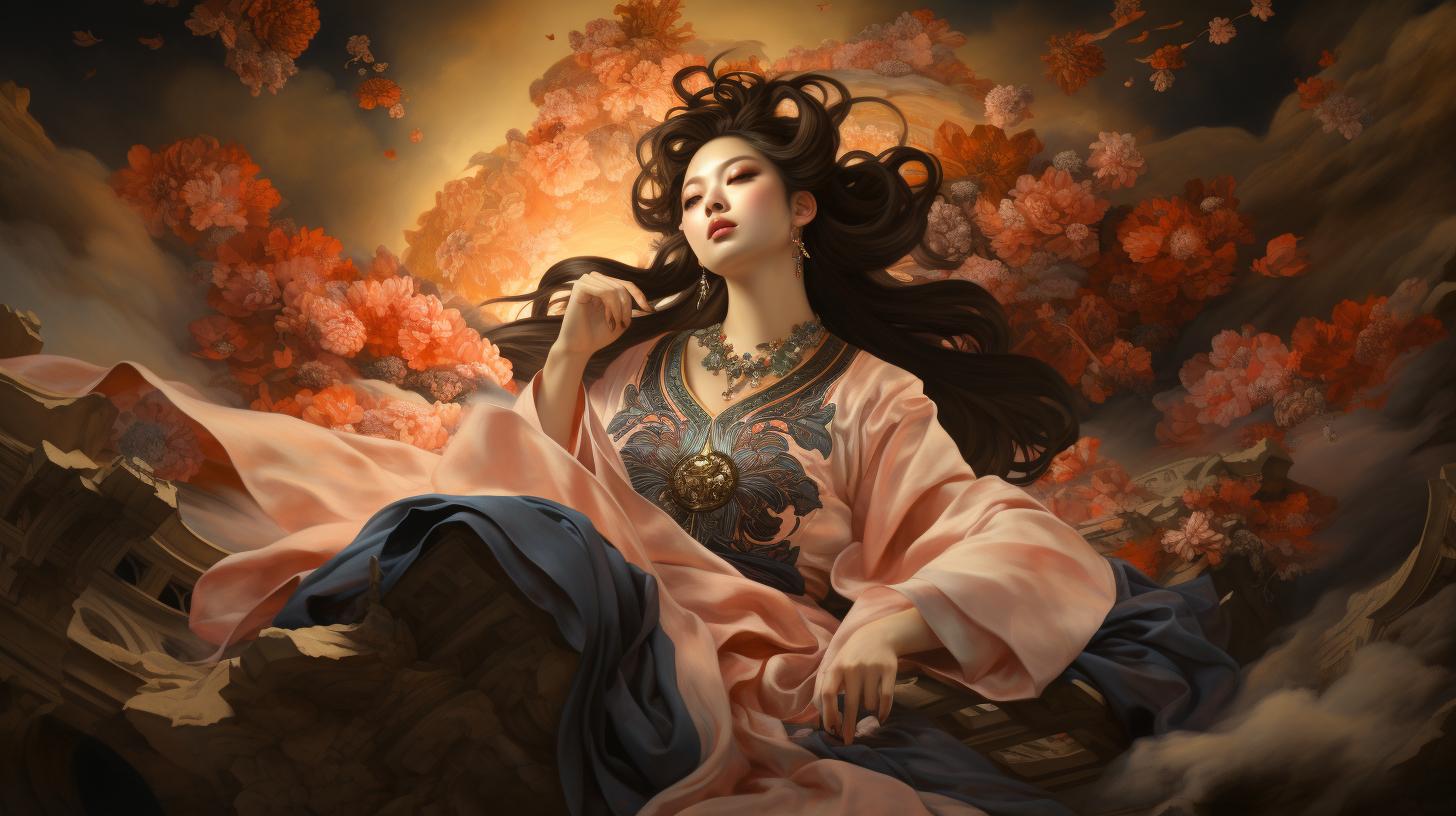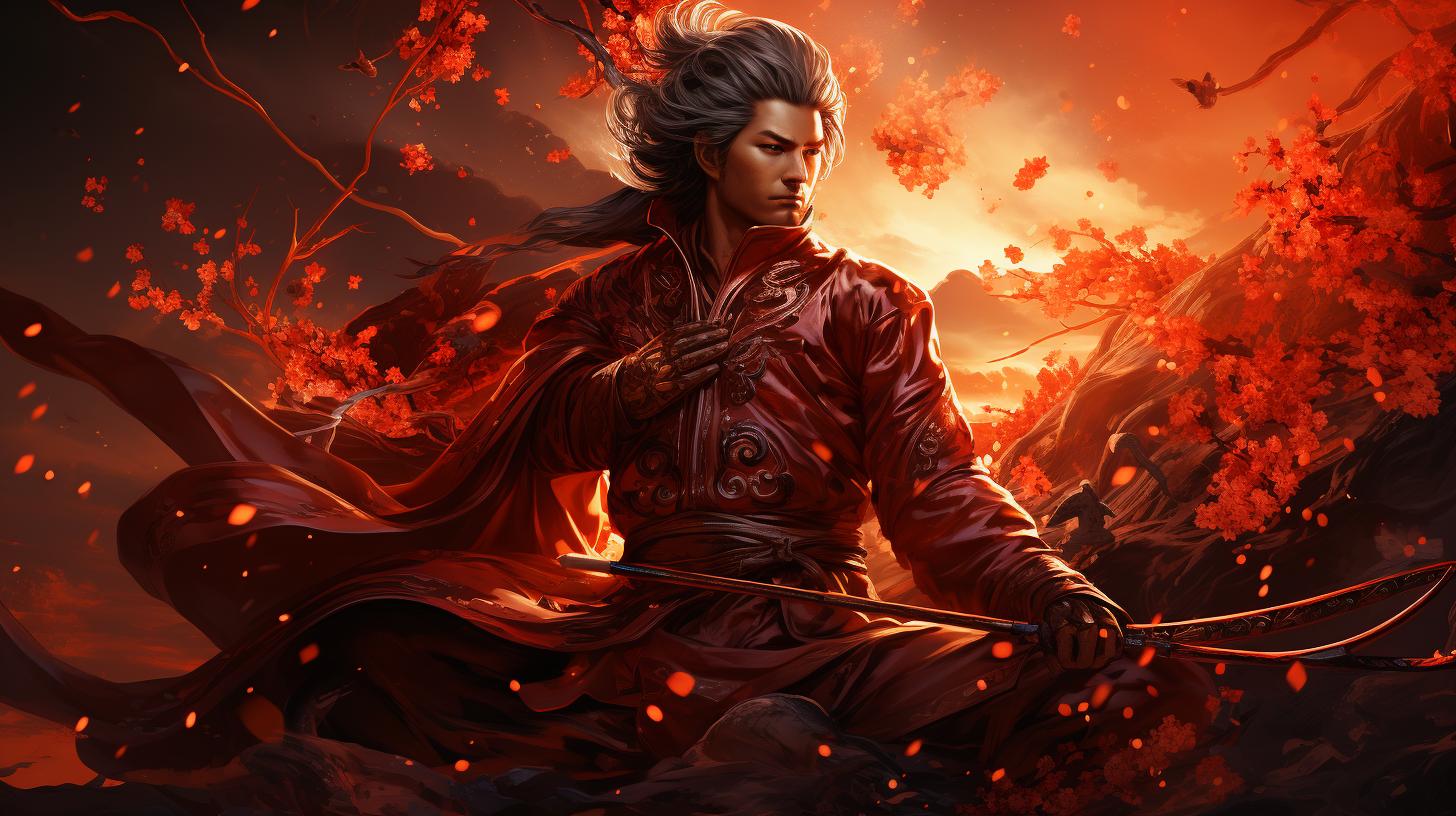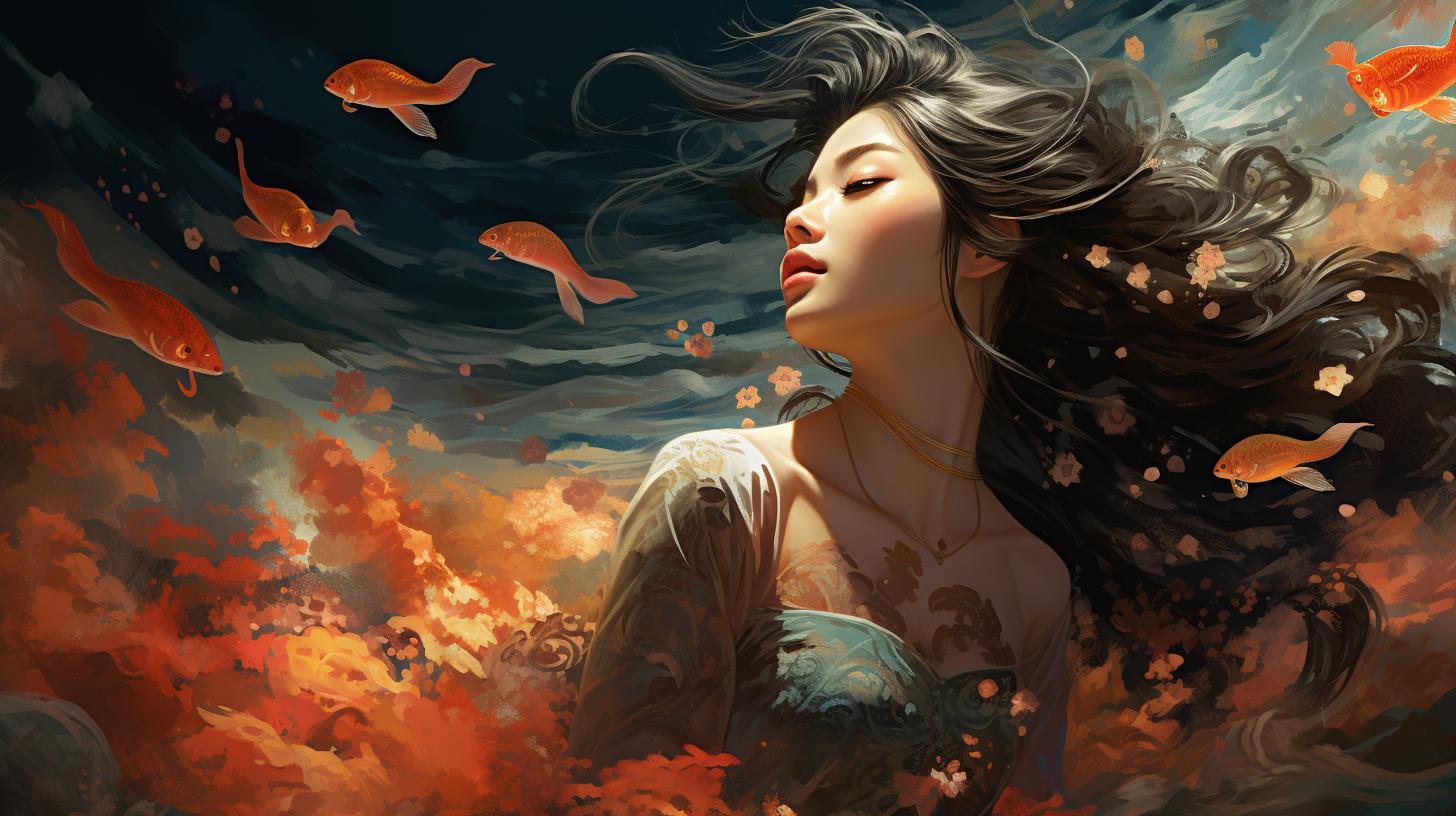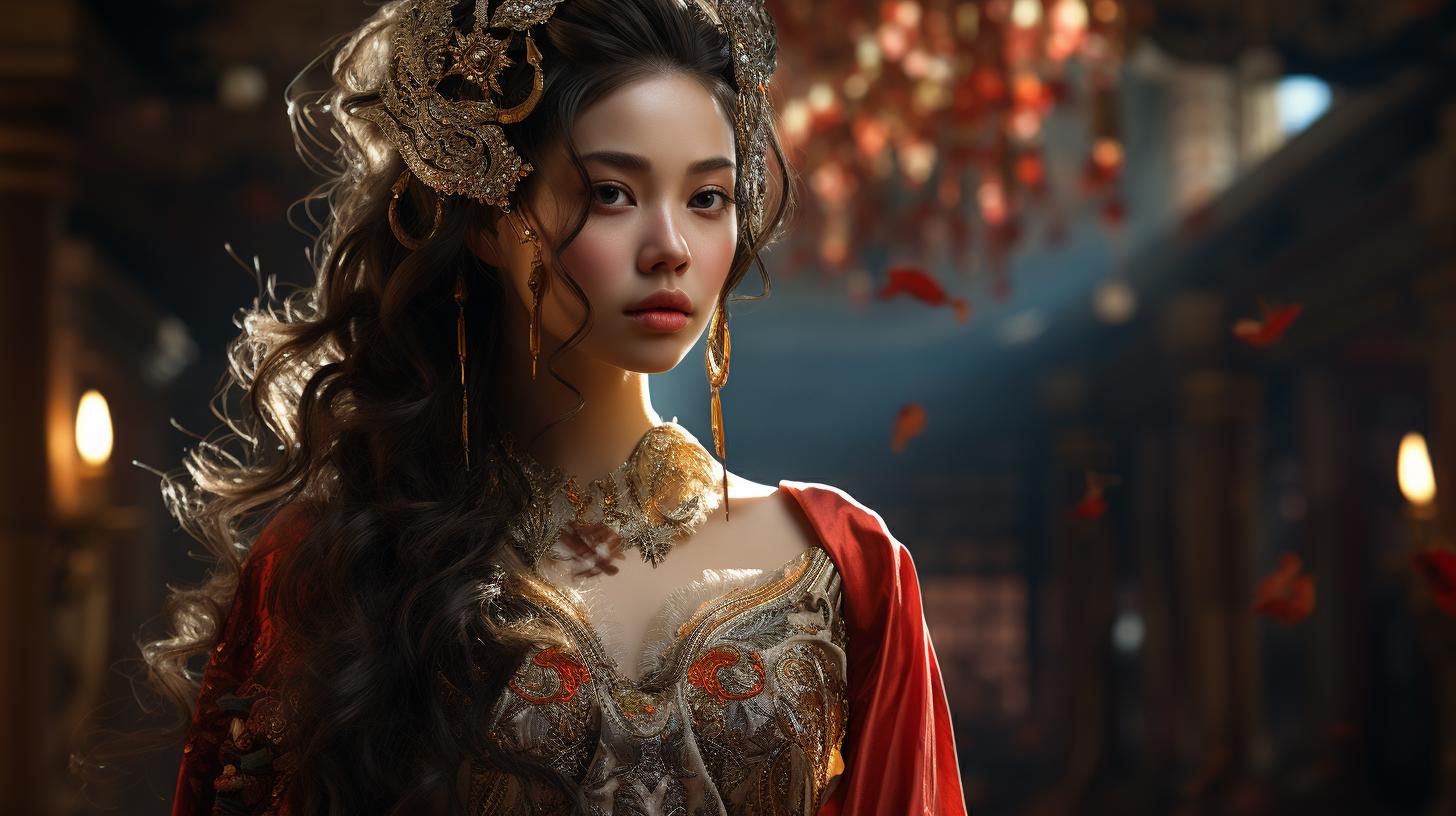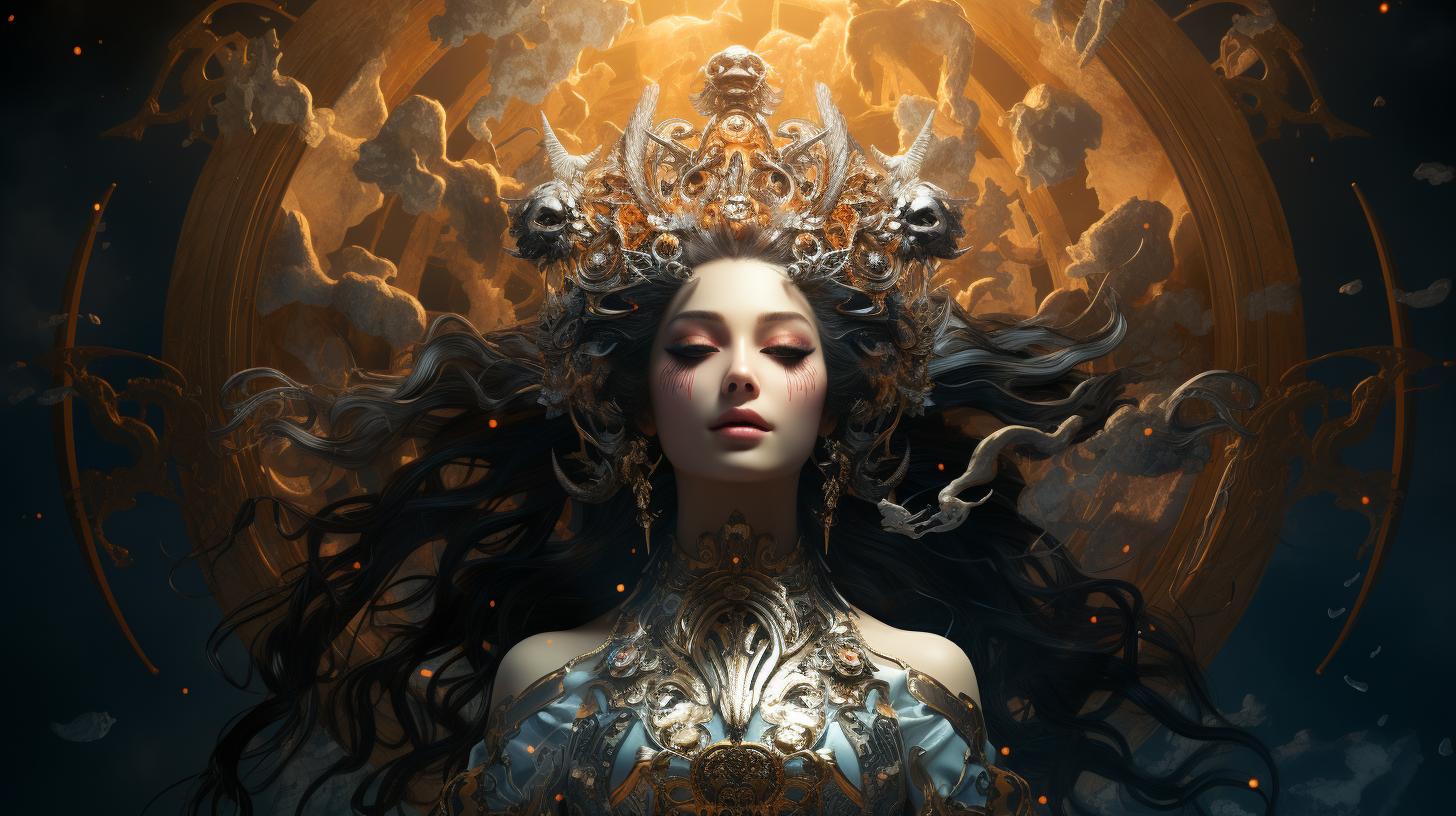Zhong Kui God: The Powerful Taoist Deity and Hunter of Demons
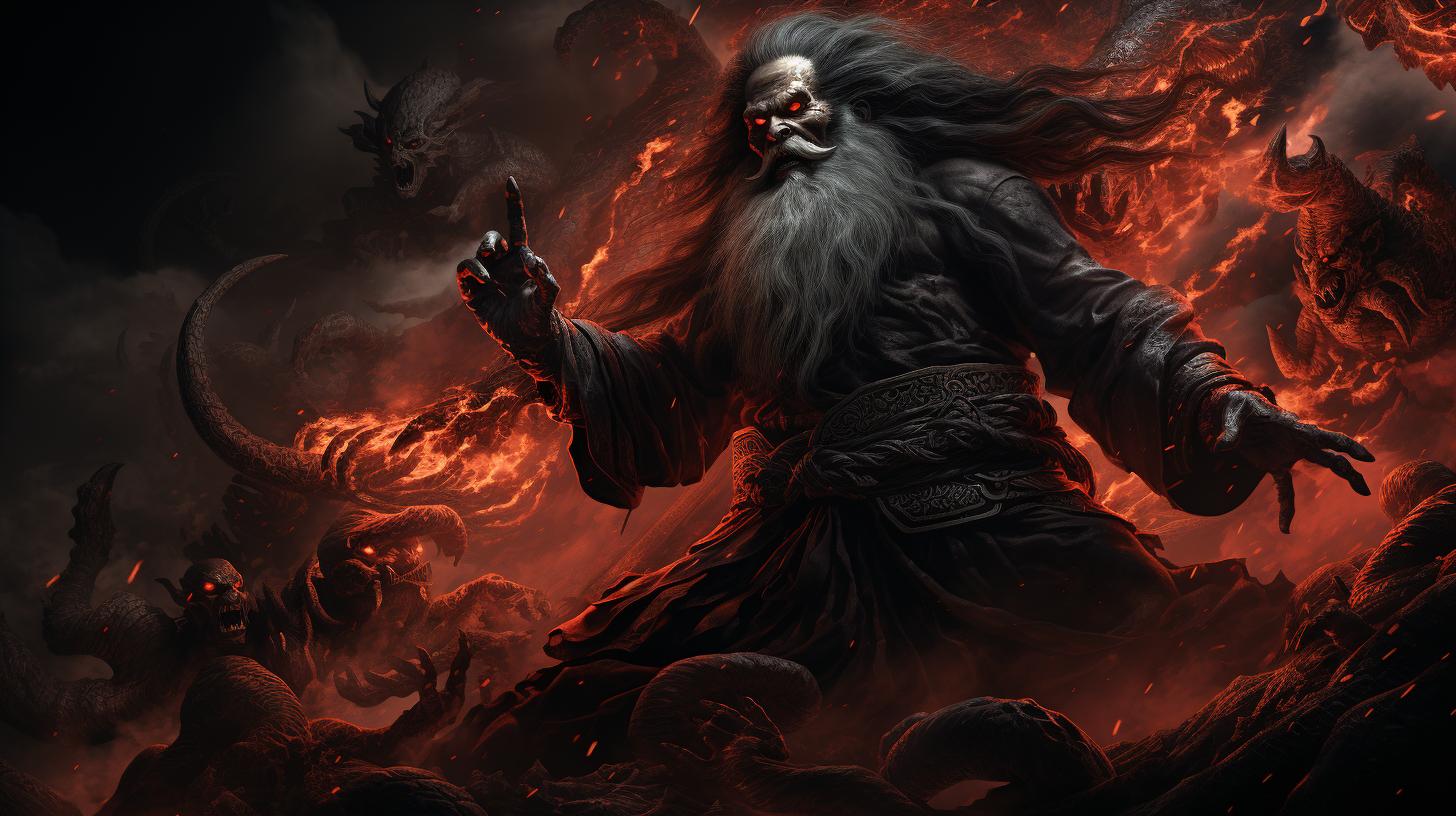
Zhong Kui god is a powerful deity in Chinese Taoist mythology. Also known as the Hunter of Demons and the King of Ghosts, Zhong Kui possesses the ability to control over 80,000 demons.
With his distinctive appearance of a large man with a black beard, bulging eyes, and an angry expression, he is often depicted in Chinese art and folklore. Zhong Kui‘s legend revolves around his journey to the imperial capital, his tragic fate, and his role as a protective spirit in homes and businesses.
This article explores various aspects of Zhong Kui‘s mythology, art, and cultural significance.
The Legend of Zhong Kui and his Rise to Power
In Chinese mythology, the legend of Zhong Kui tells a captivating tale of power, tragedy, and redemption. Zhong Kui, a talented scholar, embarked on a journey to participate in the imperial exams in the capital city of Chang’an.
Despite achieving the highest scores, his unconventional appearance led the emperor to deny him his rightful title. Filled with rage, Zhong Kui took his own life at the palace gates.
After his death, Zhong Kui faced judgment by the gods who acknowledged his exceptional abilities. He was crowned the King of Ghosts, entrusted with the role of hunting down evil spirits and protecting the mortal realm from supernatural threats.
Years later, Zhong Kui returned to his hometown to express gratitude to his loyal friend Du Ping and bestowed him a great honor — the hand of his sister in marriage.
The legendary story of Zhong Kui‘s rise to power showcases the resilience and triumph of an outcast, proving that strength comes not only from appearance but from character and inner qualities.
Zhong Kui‘s story continues to inspire and fascinate, leaving a significant impact on Chinese folklore and cultural traditions.
Depicting Zhong Kui in Chinese Mythology and Folklore
In Chinese mythology and folklore, Zhong Kui is commonly depicted as a formidable figure with a towering stature, a fierce expression, and a long, flowing black beard. His distinctive appearance reflects his status as the King of Ghosts and the Cazador de Demonios, the Demon Hunter.

Artistic representations of Zhong Kui often portray him wielding a magical sword, which he uses to vanquish demons and protect humanity from evil forces. His intimidating presence and commanding aura emphasize his role as a powerful deity in Chinese mythology.
Zhong Kui‘s connection to the five bats of fortune further enhances his significance. These bats symbolize luck, prosperity, and longevity, and are often depicted alongside Zhong Kui in art and folklore.
They represent the auspicious nature of his divine powers and his ability to bring blessings and good fortune to those who revere him.
Throughout Chinese culture, Zhong Kui is revered as a guardian spirit and a symbol of protection. His image is displayed in homes and businesses to ward off malevolent spirits and ensure prosperity.
Zhong Kui‘s presence in Chinese mythology and folklore highlights his enduring legacy as a revered deity and serves as a reminder of the ancient traditions that continue to influence Chinese culture today.
The Powerful Abilities of Zhong Kui: Conquering Demons and Ghosts
Zhong Kui, the fearsome deity of Chinese mythology, possesses incredible abilities that enable him to conquer demons and ghosts. With his commanding presence and supernatural powers, he is regarded as the ultimate protector against malevolent forces.
The legends surrounding Zhong Kui depict him as a formidable warrior, capable of single-handedly subduing vast numbers of demons. His imposing appearance, characterized by a large stature, a black beard, and fierce eyes, enhances his intimidating aura.
Zhong Kui‘s dominion over 80,000 demons underscores his significant influence in the spiritual realm. This divine authority gives him the ability to restore balance and peace by vanquishing evil entities and safeguarding mortal beings.
His unparalleled strength serves as a beacon of hope for those plagued by supernatural disturbances or haunted by vengeful spirits.
Depicted in various artistic mediums, Zhong Kui‘s portrayal often showcases him brandishing a sword, symbolizing his prowess in warfare against these malicious entities. Paintings and sculptures featuring his image are believed to possess talismanic qualities, warding off malevolent spirits from both homes and businesses.
The spread of his cult to regions like Korea, Japan, and Vietnam is a testament to his universal appeal and enduring power.
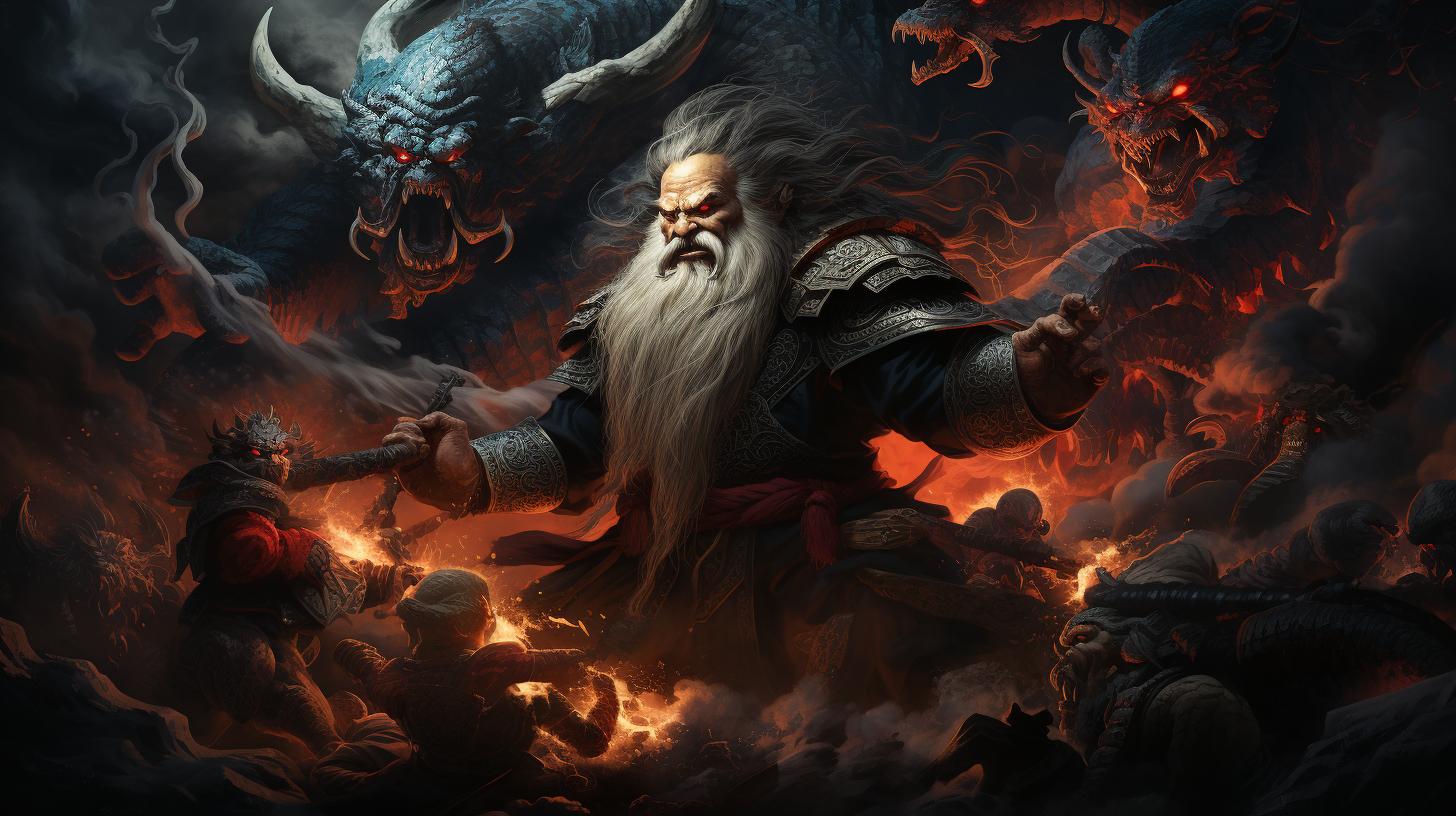
In conclusion, Zhong Kui‘s powerful abilities in conquering demons and ghosts make him an iconic figure in Chinese mythology. His presence not only inspires awe and reverence but also provides solace and comfort to those who seek protection from supernatural threats.
The Influence of Zhong Kui in Chinese Art and Culture
Zhong Kui‘s legendary status has had a profound influence on Chinese art and culture throughout history. Artists have been inspired to depict his fierce appearance and supernatural abilities in various artistic mediums.
One of the most prominent forms of artistic representation is through paintings. Zhong Kui is often portrayed with his distinctive features, such as his large stature, black beard, bulging eyes, and enraged expression.
These paintings serve not only as decorative pieces but also as spiritual guardians, hung in homes and businesses to ward off evil spirits and bring good fortune.
Additionally, Zhong Kui‘s image can be found in sculptures, woodblock prints, and even theatrical performances. His presence in these artistic forms reflects his enduring popularity and significance in Chinese culture.
Beyond visual arts, Zhong Kui‘s influence extends to literature, where his legend has been immortalized in poetry, novels, and plays. Through these literary works, the story of Zhong Kui‘s struggle against demons and his ultimate rise to become the King of Ghosts is celebrated and passed down through generations.
Overall, Zhong Kui‘s presence in Chinese art and culture is a testament to the enduring fascination with his powerful character and his ability to protect against malevolent forces. Through various artistic expressions, his legend continues to captivate and inspire people as a symbol of strength and spiritual guardianship.
The Spread of Zhong Kui‘s Cult to East Asian Countries
Zhong Kui‘s cult and legend have extended beyond China’s borders, finding their way into the traditions and mythologies of several East Asian countries. While originating in Chinese mythology, Zhong Kui‘s popularity reached countries like Korea, Japan, and Vietnam.
- In Korea, Zhong Kui is known as Janghwa Hongryeon and is associated with warding off evil spirits and bringing good luck and prosperity.
- In Japan, Zhong Kui is called Shōki and is revered as a protector against demons and diseases.
- In Vietnam, Zhong Kui is worshipped as Tụy Tùng and is believed to bring luck and protect against evil forces.
The spread of Zhong Kui‘s cult to these countries highlights the influence of Chinese culture and mythology in the East Asian region.
Despite cultural variations, the underlying belief in Zhong Kui‘s power to conquer demons and safeguard against malevolent spirits remains consistent.
Through artistic representations and oral traditions, Zhong Kui‘s legend has transcended borders and continues to resonate in various East Asian cultures. His enduring popularity testifies to the fascination with his triumph over evil forces and his ability to bring fortune and protection to those who revere him.
Zhong Kui‘s Association with the Five Bats of Fortune
One fascinating aspect of Zhong Kui‘s symbolism is his association with the Five Bats of Fortune. In Chinese culture, bats are considered powerful symbols of luck, wealth, and prosperity. The number five also holds significant meaning, representing the five core elements of the Chinese cosmology: wood, fire, earth, metal, and water.
According to tradition, Zhong Kui is often depicted alongside five bats, symbolizing his ability to bring good fortune to those who believe in him. The bats are typically portrayed in flight, their wings spread wide, representing abundance and a prosperous future.
This association between Zhong Kui and the Five Bats of Fortune has made him a popular figure during Chinese New Year celebrations. People hang his image in their homes and businesses to attract positive energy and ward off negative influences.
Additionally, this symbol is often used in traditional Chinese painting and artwork to invoke prosperity and happiness.
The imagery of Zhong Kui and the Five Bats of Fortune serves as a reminder of the belief in the power of divine protection and the desire for a prosperous life.
It is a testament to the enduring cultural significance of Zhong Kui, both as a mythical figure and as a symbol of good fortune in Chinese society.
Emperor Xuanzong’s Dream: Zhong Kui as a Savior from Illness
During the reign of Emperor Xuanzong of the Tang Dynasty, a remarkable dream would forever change the perception of Zhong Kui. The emperor, suffering from a severe illness, had a vision in which he saw Zhong Kui triumphantly defeating a menacing ghost.
Intrigued and hopeful for his own recovery, Emperor Xuanzong commissioned the creation of an image depicting Zhong Kui.
Believing that Zhong Kui possessed the power to ward off evil and bestow good fortune, the emperor viewed this deity as a potential savior from his ailment. Inspired by the dream, Emperor Xuanzong’s image of Zhong Kui gained popularity and influenced subsequent portrayals of the deity in art and culture.
This dream solidified Zhong Kui‘s significance as a symbol of protection and well-being. It fostered a belief in his ability to shield individuals and spaces from malevolent spirits and bad luck.
Zhong Kui became an integral part of traditional celebrations, particularly Chinese New Year, where his presence ensured a prosperous and harmonious start to the year.
Zhong Kui and his Friend Du Ping’s Journey to the Imperial Capital
In the captivating tale of Zhong Kui, he embarks on a significant journey to the imperial capital of Chang’an, accompanied by his loyal friend, Du Ping. Their purpose is to participate in the imperial examinations, a highly esteemed event for scholars aspiring to governmental positions.
Zhong Kui‘s exceptional intelligence and knowledge shine through, as he achieves the highest score in the exams. However, his physical appearance, deemed unattractive by the emperor, leads to a devastating outcome.
Despite his remarkable accomplishment, the emperor unjustly denies Zhong Kui his rightful title. Overwhelmed by anger and despair, Zhong Kui elects to end his own life by striking the palace gates.
In the aftermath of his death, Zhong Kui faces judgment by the gods, who appoint him as the illustrious King of Ghosts. As the years pass, driven by gratitude, the ghostly king returns to his hometown to express his appreciation to Du Ping.
In a generous gesture, Zhong Kui gifts Du Ping with his own sister’s hand in marriage, recognizing the unwavering friendship they share.
Zhong Kui‘s Tragic Fate and Return to his Hometown
After Zhong Kui achieved the highest score in the imperial exams, his dreams of a prestigious title were shattered due to his unappealing appearance. Filled with rage and heartache, he tragically ended his own life by crashing into the palace gates.
However, his story did not end there. Following his death, Zhong Kui stood before the divine judges who recognized his righteousness and appointed him as the King of Ghosts.
Years later, Zhong Kui returned to his hometown to express gratitude to his loyal friend Du Ping. As a sign of appreciation, Zhong Kui bestowed Du Ping’s sister with his hand in marriage.
This reunion symbolized Zhong Kui‘s bittersweet journey, showcasing the tragedy behind his outwardly fearsome appearance.
Zhong Kui‘s narrative serves as a poignant reminder of societal judgments based on appearances and the often unseen inner qualities of an individual. His tale speaks to the power of overcoming adversity and finding victory despite external setbacks.
Zhong Kui‘s Image as a Protective Spirit in Homes and Businesses
In Chinese culture, Zhong Kui is revered as a powerful and protective spirit, making him a popular choice for homes and businesses seeking spiritual guardianship. His image is often displayed prominently to ward off negative energies and bring good fortune.
Many households hang paintings or sculptures of Zhong Kui on their doors or walls as a symbolic defense against malevolent spirits and ghosts. The belief is that his fearsome appearance and ability to control demons will intimidate and repel any evil forces that may try to enter.
As a result, Zhong Kui is considered a guardian against misfortune and a bringer of luck.
In commercial settings, Zhong Kui‘s image is often seen in establishments dealing with valuable items or finances, such as banks, jewelry stores, or auction houses. His presence is believed to safeguard the business from theft, deception, or any other negative influences that could impact prosperity.
It is also not uncommon to find Zhong Kui‘s image during the annual Chinese New Year celebrations. Displayed alongside other auspicious symbols, his figurines or paintings are believed to help start the year on a positive note and ensure good luck and protection throughout the coming months.
- Zhong Kui‘s fierce expression and commanding presence make his representation a visible symbol of protection.
- Hanging his image in homes and businesses is seen as a way to deter evil spirits and attract positive energies.
- His presence is especially valued in commercial establishments dealing with valuable assets or financial matters.
- Zhong Kui‘s image is often included in Chinese New Year decorations, enhancing the festive atmosphere and invoking good fortune for the year ahead.
Popular Sayings and Phrases Associated with Zhong Kui‘s Power and Status
- “Da Gui Jie Zhong Kui” – Finishing a task as if done by someone of higher power or status.
- “Zhong Kui‘s might scares away evil spirits.”
- “Seeking Zhong Kui‘s blessings for prosperity and fortune.”
- “In times of adversity, call upon Zhong Kui for protection.”
- “May Zhong Kui‘s wisdom guide us through challenges.”
- “Zhong Kui‘s presence brings peace and security.”
- “With Zhong Kui‘s name, darkness fades away.”
- “Zhong Kui, the guardian against malevolent forces.”
- “Zhong Kui‘s power conquers all obstacles.”
Throughout Chinese culture, various sayings and phrases have emerged to reflect the power and status associated with Zhong Kui.
These expressions highlight the belief in his ability to protect against evil, bring prosperity, and offer guidance in difficult times. People seek the blessings of Zhong Kui to ward off negative influences and ensure a secure and prosperous future.
His name is invoked as a symbol of strength, wisdom, and courage in overcoming challenges. Zhong Kui is revered as a guardian against malevolent forces, someone who brings light to darkness and ensures peace and security.
The popularity of these sayings demonstrates the widespread influence of Zhong Kui‘s legend and the deep-rooted belief in his power and status….











